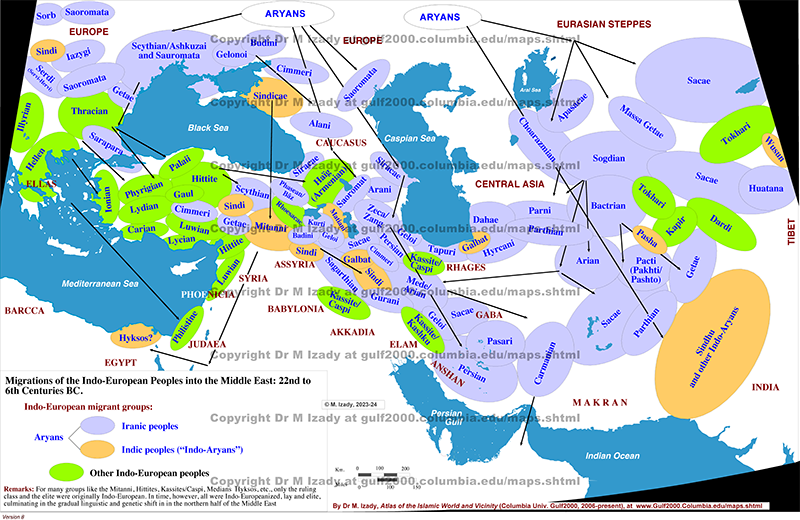Arrival of the Indo-European Peoples into the Middle East: the Early Phase
Frame and Legend
The map groups migrants as Aryans, Iranic peoples, Indic peoples (“Indo-Aryans”), and other Indo-European peoples. Macro-regions labeled include EUROPE, EURASIAN STEPPES, CENTRAL ASIA, CAUCASUS, TIBET, INDIA, the Mediterranean Sea, Black Sea, Caspian Sea, Aral Sea, the Persian Gulf, Indian Ocean, MAKRAN, ELAM/ANSHAN, ASSYRIA, BABYLONIA, AKKADIA, PHOENICIA, SYRIA, JUDAEA, and EGYPT.
A remark on the sheet notes that for groups such as the Mitanni, Hittites, Kassites/Caspi, Medes, Hyksos, etc., at first only the ruling class and elite were Indo-European; over time, broader populations became Indo-Europeanized, contributing to linguistic and genetic shifts across the northern Middle East.
Routes and Clusters (as labeled)
-
From the Eurasian Steppes/Central Asia: Names such as Sacae, Massagetae/Getae, Tokhari, Wusun, Sogdian, Bactrian, Hyrcani, Dahae, Parni/Parthian, Arian, Pasari, and Gaba appear in bands pointing toward Iran, Elam/Anshan, and the Zagros approaches.
-
Caucasus to Northern Mesopotamia/Iran: Ovals mark Alani, Siraces, Sindi, Gelae/Kadusii, Tapuri, Zaza/Zangi?, Cossaei, Gurani, Mannaeans, Medes, and Persians, threading along the Zagros and into Elam.
-
Anatolia and the Aegean rim: Labels include Hittite, Luwian, Lycian, Carian, Palaic, Phrygian, Lydian, Cimmeri, Getae, and Thracian, extending toward HELLAS.
-
Levant and Egypt: The sheet shows PHOENICIA, SYRIA, ASSYRIA, BABYLONIA, AKKADIA, JUDAEA, EGYPT, with notes such as Philistine and Hyksos? indicating Indo-European links in elite strata.
-
Indo-Aryan/Indic spectrum: Large fields mark Sindhi and other Indo-Aryans in INDIA, with Dardi, Kohistani, Pakti (Pakhti/Pashto) on the highland arc toward TIBET and Makran.
Pattern Highlighted by the Sheet
Arrows and overlapping ovals visualize a south- and west-drifting corridor: from Europe and the Eurasian Steppes, through Central Asia and the Caucasus, into Anatolia, Iran, and Mesopotamia, with maritime-rim contacts in the Levant, Egypt, and the Persian Gulf/Indian Ocean. The legend’s migrant classes (Aryan, Iranic, Indic, other IE) and the remark about elite-led Indo-Europeanization frame how names on the map relate to language and rulership rather than uniform mass replacement.
